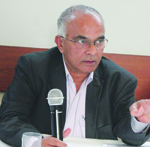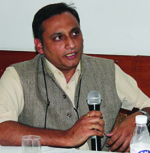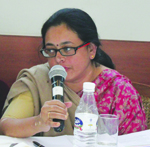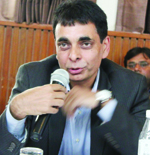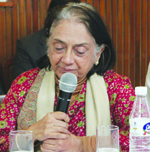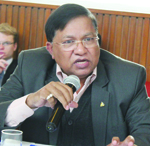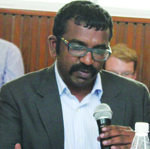"Resilience" – An important aspect of Smart Cities

"Smart City" is the buzz word that is hovering all over India for quite some time. But what is the definition of a Smart City? Is it only to transform a city smart by using some digital technologies to enhance performance and wellbeing, to reduce costs and resource consumption and to engage more effectively and actively with its citizens or does it involve an integrated approach? Well, it has to be a mix of both for realizing the true potential of a Smart City.
 |
A growing number of cities are committing to a smart city vision in order to meet the challenges of sustainable growth, help rejuvenate their economics, and establish their place in IT-related industries of the future. In a country like India where there are a lot of challenges whether it is climatic, economic, population, health or any other, the foremost important aspect is resilience of system to meet the challenges. Without resilience, it is difficult to take India to the next level.
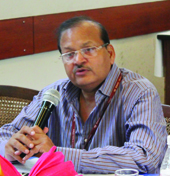 |
Shri Shankar Aggarwal, IAS Secretary, Ministry of Urban Development, GOI
"If you talk about 100 smart cities, then why is it smart? If you look at it, it is only technology which brings a paradigm shift to the way society progresses. In the last ten years, it is because of ICT things have changed. No city can survive unless there is a robust mechanism of resilience. We require resilience against natural calamity, social infrastructure, economy. I would be happy if each of the 100 towns create a framework which will ensure resilience for each of the towns against all the calamities which can disturb the stability of a town.”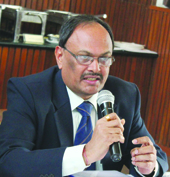 |
Shri H. K. Das, IAS, Inter-State Council Secretariat, Ministry of Home Affairs,GOI
“Disaster management is one key area that remained unnoticed in the Smart City concept. As the challenges are great, we should take a holistic approach so that we are able to take India to the next level. Perhaps, this is a change that has come with the new government in the Centre. It does not talk about urban renewal rather urban re-engineering. Time has come that we move from urban renewal to urban re-engineering that is where we will be able to make a change.”
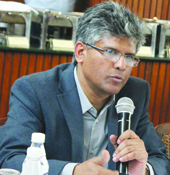 |
Prof. Jagan Shah Director, National Institute of Urban Affairs
The Ministry of Urban Development has published a concept note on public domain on the development of smart cities. It is good for us that there is a commitment to build a resilient smart city. However, the understanding what would constitute a resilient smart city is presently a work in progress. There is a whole set of commitments that are required from the ULB or state governments that will take charge of smart city project within India. These do include disaster management plan and if we are talking about 100 smart cities then there are cities that are yet to be included. It also involves a colligate system of decision-making.
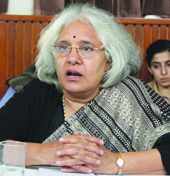 |
Prof. Usha P. Raghupathi NIUA
“When we talk of smart cities,we need cities that are not just about technology, economics or social aspects. It has to be a good mix of physical, economic and social aspects. We talk a lot about technologies when it comes to smart cities, putting up various systems, but we need to get the governance system going, need to get the people involved, need to see how resilience can be built into different sectors. How do we get smart cities for everyone, where everybody can feel it is their city and they must take care of it. It is bringing everybody together into the system and makes it resilient. Resilience also comes from getting the governance structure right.”
A high-level industry round table was convened at the India International Centre, New Delhi on 9th December to discuss the importance of developing smarter, resilient cities in India. The event was the culmination of eight years of research and demonstration projects undertaken by TARU Leading Edge and other ACCCRN partners in India. The attendees included Shri Shankar Aggarwal, IAS, Secretary, Ministry of Urban Development; Shri H. K. Das, IAS, Inter-State Council Secretariat, Ministry of Home Affairs, Prof. Jagan Shah, Director, National Institute of Urban Affairs, Prof. Usha P. Raghupathi, NIUA and experts from MoES, TERI, IIT Delhi, IRADe, SPA, TARU, UNDP, ICRIER, ICF, APCO, CISCO, ICLEI and others.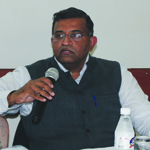 |
| Rameesh Kailasam, Senior Director, APCO Worldwide |
The subsequent discussions were wide-ranging, but participants agreed on the importance of the following points:
• Ensure India’s Smart Cities are also resilient cities • Employ smart methods to manage limited natural resources • Use early warning systems to mitigate risks • Provide reliable access to services necessary for compact and smart cities • Promote network - informed planning • Create an enabling environment for the private sector and communities • Introduce community-up planning • Employ big data for ULB management – Regulating urban metabolism • Harness big data to target services and infrastructure on the poor • Shift the focus of traffic solutions from mobility to accessThe Panel
 |
See What’s Next in Tech With the Fast Forward Newsletter
Tweets From @varindiamag
Nothing to see here - yet
When they Tweet, their Tweets will show up here.





